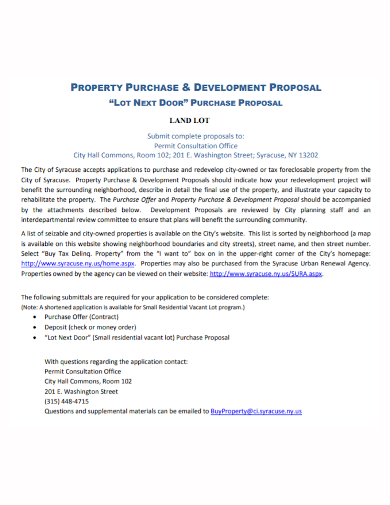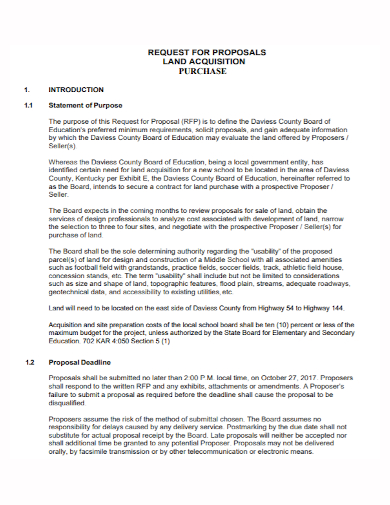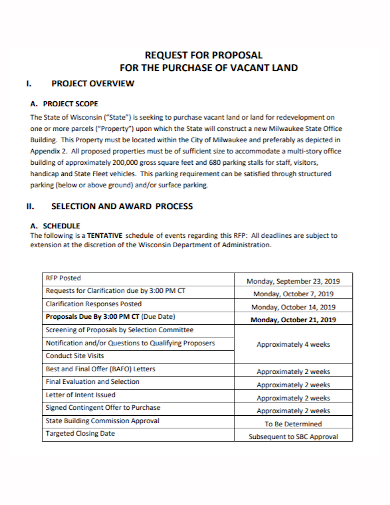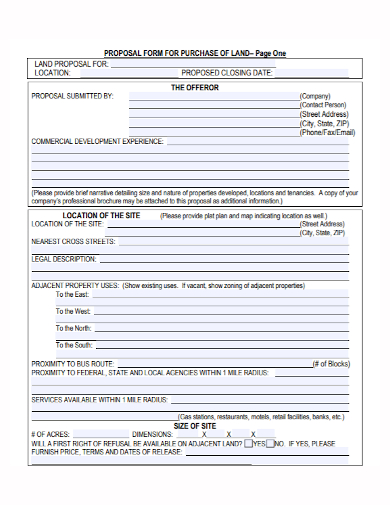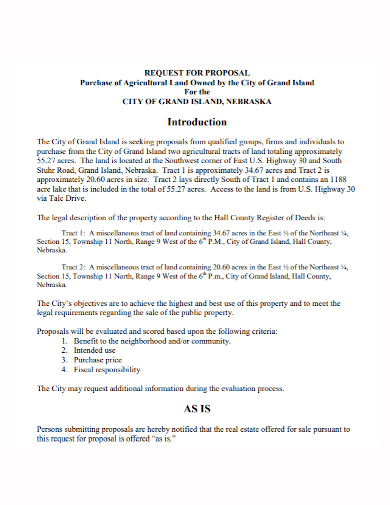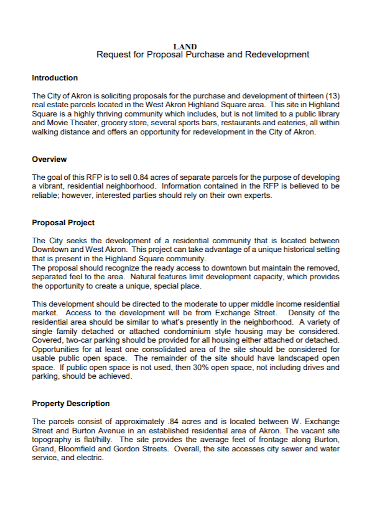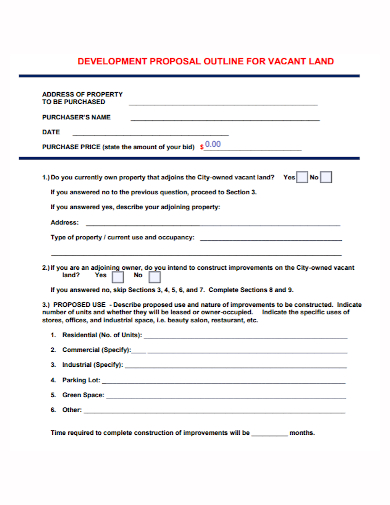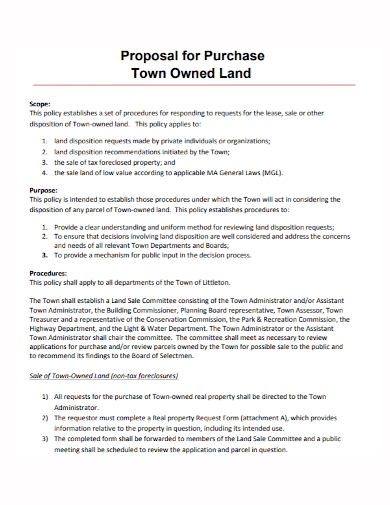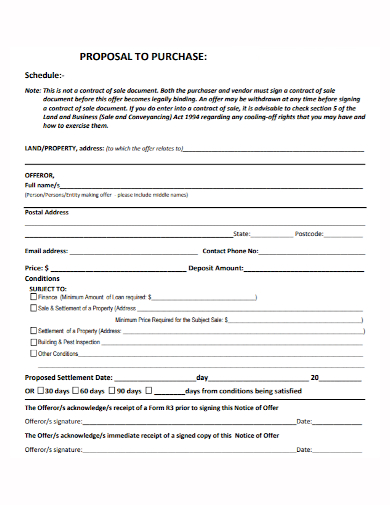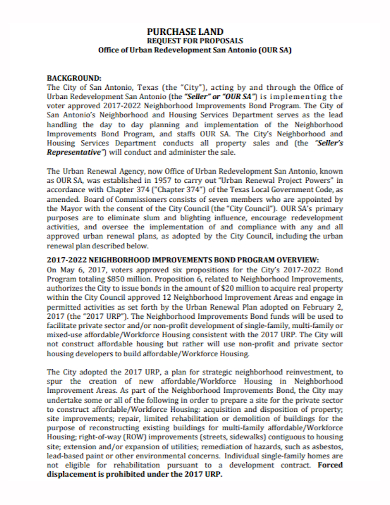Are you planning to purchase a land in the near future? Buying a land is one complicated process but it’s all going to be worth it once you get the title of the land that signifies that you are the owner. One of the processes you’re going to encounter when you buy land is you need to make a purchase proposal to a landowner who is selling their land or to a real estate company indicating that you’re interested to purchase the land and that you have enough resources to be qualified to buy it without any issues. This article will guide you on how a land purchase process is usually done and how to make a land purchase proposal. Read the article to know how to make one.
10+ Land Purchase Proposal Samples
1. Land Purchase Proposal Template
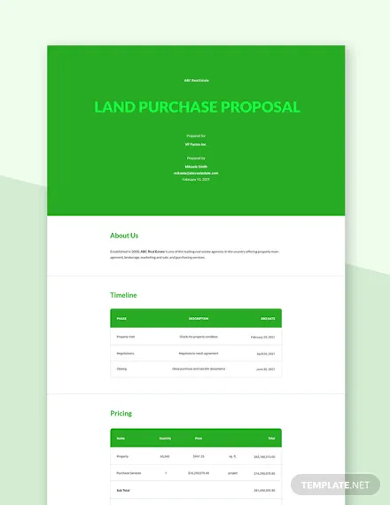
2. Property Land Purchase Proposal
3. Land Acquisition Purchase Proposal
4. Vacant Land Purchase Proposal
5. Land Purchase Proposal Form
6. Agricultural Land Purchase Proposal
7. Land Development Purchase Proposal
8. Vacant Land Development Purchase Proposal
9. Owned Land Purchase Proposal
10. Sample Land Purchase Proposal
11. Urban Land Development Purchase Proposal
How to Purchase Land?
1. Find a Land for Sale
You won’t always drive by a good investment property. If you want to buy land but aren’t sure where to start, look online. A land-specific agent can help you navigate through the alternatives and locate the perfect match. The different types of lands available for sale are:
- Timberland
- Farms for sale
- Ranches for sale
- Development sites
- Homesites
2. Dig Into the Smaller Details
Don’t rush into buying land without first understanding about it. The first item to check into is the county’s zoning restrictions. Local governments employ zoning to give some restrictions in property development.
Typical zoning regulations include:
- The type of buildings allowed
- A specific kind of business not allowed
- Size and height of buildings
- Location of utility lines
Once you know the land’s constraints, you’ll want to know if permits are included. If you wish to build anything on the land, you need a permit. Permits for:
- Sewer
- Utilities
- Road access
3. Get Your Financing Details in Order
You’ll need some documents to make a cash offer. First, the seller may ask for proof of funds. Sellers want confirmation of deposit and closing costs. Money proof should be on institution letterhead. This includes the date, account holder’s name, and balance. An open equity line of credit or a bank statement can be accepted as proof of funds.
4. Make an Offer to the Seller in Writing
Verbal real estate deals fail. Keep track of the land’s value, price, location, and contingencies. Ask questions about the land before making an offer. Risks guard you. Then you’ll want to spend money and time. This way, you can get your earnest money back if something goes wrong.
Examples of cash-only situations:
- A current survey showing the correct borders and lot size, as well as any probable easements or encroachments
- Zoning regulations fit buyers’ needs. After accepting the offer, you may use an agreement to make the purchase legally binding.
5. Deliver the Deposit
You’ll add earnest money with your cash offer. Earnest money is a little deposit put into an escrow to prove you’re a genuine buyer. The seller keeps the money if you walk away from the contract for any reason not covered by the stipulations.
6. Get Environmental Tests Done
The same goes for buying land. The soil needs testing. Tests for seismic damage and sinkhole potential. Check the soil’s moisture content. If you plan to construct on the land, make sure the soil is stable.
7. Look into a Survey
A land survey will show you the exact location of the boundaries. Surveyors will mark the land’s corners with rebar flush with the earth. Surveyors employ monument markers, such as a wood stick, to designate any underground pipes.
8. Check Over the Title
Check the title before buying land. A title search can reveal restrictions or easements. A third party may use part of the property. Maybe a utility authorized to construct poles. You won’t be walking into a house, but the land. A walk-around confirms results from a land surveyor title search. Like a house, you should inspect the land.
9. Pay the Seller
After the inspection period, it’s time to pay the seller. A cashier’s check is the most popular payment method. Personal checks aren’t accepted when substantial sums of money are involved. A cashier’s check is issued by a bank, removing any doubts about its legality.
Details to Include in a Land Purchase Proposal
- The buyer and seller’s full names, addresses, and contact information
- The purchase price that was agreed upon
- The amount of deposit money that was agreed upon
- The deposit terms and conditions
- A description of the land
- The agreement’s signature date
FAQs
What documents to check before you buy land?
The documents you need to buy land are title deeds, sales deeds, tax receipts, bills, pledged land, measurement of the land, the agreement between seller and buyer, and registration.
What are the expenses of buying land?
There are a lot of expenses when you buy land. For example, you need to pay for various fees, permits, the cost of purchasing the land you need, the cost of building your house, and the cost of making adjustments to the land to make it accessible to have running water and other utilities.
After you have given the cashier’s check, it’s time to get the title deed. You can either go to the registry office and close and record the deed or close it at a title company. Let the real estate agent help you through this process or you can hire an attorney to help you look over the contracts and proposals that you will sign before filing the deed. To help you get started making the proposal, download our free sample templates above to use as your guide!
Related Posts
FREE 14+ Sample Lease Proposal Letter
FREE 12+ Capital Investment Proposal Samples
FREE 10+ Real Estate Project Proposal Samples
FREE 10+ Private Equity Investment Proposal Samples
FREE 10+ Sample Lease Purchase Agreement
FREE 10+ Vacant Land Purchase Agreement Samples
FREE 8+ Commercial Purchase Agreement Templates
FREE 8+ Joint Venture Proposal Samples
FREE 3+ New Lease Proposal Samples
FREE 16+ Investment Proposal Templates
FREE 15+ Purchase Letter of Intent Samples
FREE 14+ Sample Funding Proposal
FREE 11+ Sales Proposal Samples
FREE 6+ Sample Sales Proposal Letter
FREE 3+ Farm Management Agreement Samples

